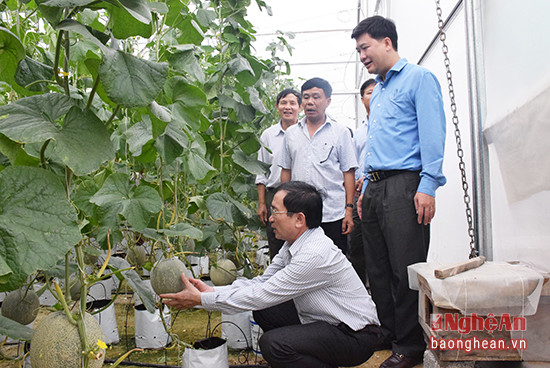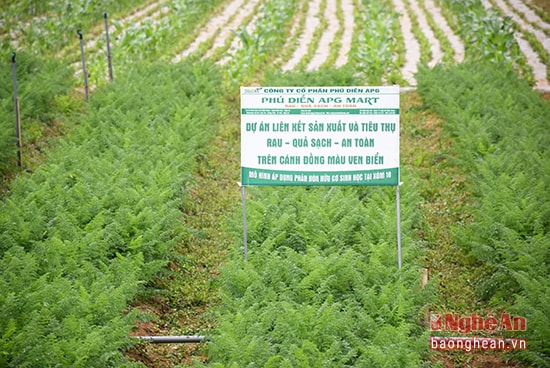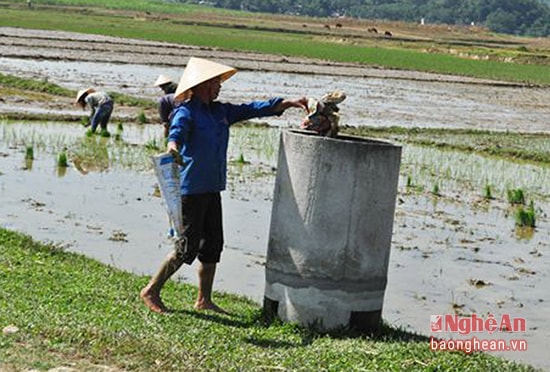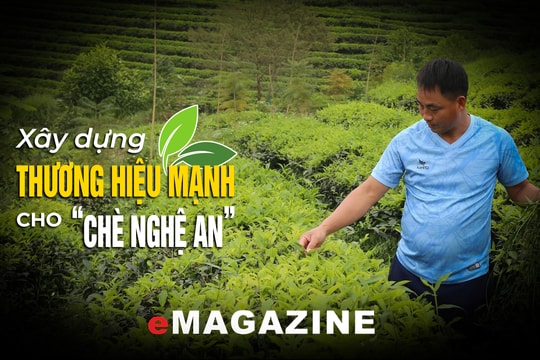Clean agricultural production is an essential need.
(Baonghean) - In order to use plant protection drugs (PPP) safely and effectively in agricultural production, in recent years, the agricultural sector has implemented many active programs. Thereby, helping farmers increase productivity, output, quality of crop products and move towards a sustainable, environmentally friendly agriculture.
Attention to reducing pollution from agricultural waste
In recent years, authorities such as the Department of Natural Resources and Environment and the Department of Crop Production and Plant Protection (PPP) have recommended that localities organize the collection of agricultural waste in general and plant protection waste in particular by placing bins right in some fields. Up to now, with the province's investment budget, the whole province has placed about 1,600 bins for collecting plant protection waste in 10 districts.
In addition, the Department of Natural Resources and Environment, the Department of Crop Production - Plant Protection and some localities also invest. However, the collection and proper treatment of plant protection waste annually is only 2 - 3 tons, equivalent to about 1/10 of the amount of plant protection waste each year. In 2016, of the 2.5 tons of plant protection waste that localities registered to treat, Quynh Luu district had 500 kg, Dien Chau 300 kg, Quy Hop and Nghia Dan 200 kg.
 |
| Provincial leaders visited the greenhouse melon production model of Mr. Truong Van Hoa, Hoi Son commune (Anh Son). Photo: XH |
To reduce environmental pollution caused by waste bottles and pesticide packaging, in recent times, sectors and levels in the province have always paid attention and taken many specific actions to link production with environmental protection. Accordingly, every year, the Plant Protection Department has a document directing localities to promote propaganda, training and guidance on "Safe use of pesticides" for farmers. At the same time, build a pilot model of "Protecting the environment with farmers" (collecting waste, pesticide packaging), "Eco-technology" associated with agricultural culture in the districts: Yen Thanh, Quynh Luu, Dien Chau, Do Luong, Thanh Chuong...
Applying the "4 reductions" rice production method
In the 2016 summer-autumn rice crop, households in hamlet 7, Hung Tien commune (Hung Nguyen) implemented the rice production model according to the SRI program. This is a farming system based on the basic principles of using seedlings; sparse planting to promote photosynthesis; creating ventilation in the rice field ecosystem, limiting pests and diseases; reasonable fertilization to create conditions for rice stalks to have the ability to develop effectively; water management based on the characteristics of the rice plant when tillering, needing to drain water to create conditions for the rice to tiller many tillers...
Comparison shows that rice production under the SRI program is clearly effective, with rice productivity increasing by 15-20% compared to traditional production. In particular, many rice areas have very few pests throughout the season, so there is no need to spray pesticides. This is an environmentally friendly production method, ensuring human health, helping farmers reduce costs from using pesticides, fertilizers and labor.
According to the Department of Crop Production - Plant Protection, the rice production program according to the SRI process has been implemented in Nghe An since 2008. After 8 years, the Department has deployed 70 training courses for farmers and agricultural and extension officers at the grassroots level. Combined with 1 training course is a model with an area of 1 hectare so that people can see the effectiveness of the SRI program. From the success of the model, up to now, the rice area applied by farmers to produce according to the SRI process in the whole province is more than 8,000 hectares. In addition, Nghe An also applies the ICM rice production process (Integrated Crop Management - "3 reductions 3 increases") with an area of more than 1,200 hectares.
Applying techniques from new production programs in rice production helps reduce spraying 2-3 times/crop. Thereby, limiting pests, balancing the rice field ecosystem, reducing production costs, protecting farmers' health and protecting the living environment. However, the area applying SRI or ICM programs is still very small compared to the total rice area of the whole province of over 90,000 hectares. Therefore, functional agencies and local authorities need to step up propaganda and guidance work, through models for farmers to apply and follow, in order to limit the use of pesticides in rice cultivation and other crops.
Expanding the area of safe and clean vegetables
For other types of vegetables, in recent years, the agricultural sector, the government and local people have paid attention to implementing a number of models of clean vegetable, root and fruit production to supply consumers. Typical examples include the product of melon grown in greenhouses, using Israeli technology by Mr. Truong Van Hoa in Hamlet 2, Hoi Son Commune (Anh Son) and Hoang Van Huong in Hamlet 7, Dien Thanh Commune (Dien Chau).
The special thing about Mr. Truong Van Hoa's model is that the melons are grown on a substrate, without soil, opening a new direction for agriculture in Nghe An. The fertilization process is combined with drip irrigation that is brought to the roots, at the required level, absolutely no pesticides are used. Currently, Mr. Hoa and Mr. Huong's greenhouse area is used to grow clean vegetables, and in the summer, they grow melons.
 |
| Vegetable production according to safe processes in Dien Thanh commune, Dien Chau district |
Dien Chau district has more than 2,000 hectares of vegetable growing area. Every year, the district People's Committee directs the communes in the color areas to build a specialized clean vegetable growing area of 5-10 hectares to expand. Thanks to that, up to now, the area of safe vegetable production in Dien Chau accounts for about 40% of the district's vegetable area. In the winter crop of 2015, Dien Thanh commune was selected by the district People's Committee to build a pilot model of safe vegetable growing, in conjunction with Phu Dien Joint Stock Company to process and consume products. In addition to training and transferring science on safe vegetable growing processes to households participating in the model, the district People's Committee also supported Dien Thanh with 180 million VND to build a processing house, supporting farmers in promoting and consuming products. Thanks to that, up to now, all 60 hectares of specialized vegetables in Dien Thanh have been converted to clean production according to the process of the VietGAP model.
Quynh Luu district is considered the largest vegetable granary in the province. According to Mr. Nguyen Xuan Dinh - Head of the district's Department of Agriculture and Rural Development, the locality has more than 1,000 hectares of land specializing in growing vegetables. Currently, the district has successfully applied the clean vegetable growing model in Quynh Luong commune with 10 hectares of specialized cultivation, certified by the competent authority as VietGAP. In the future, 100% of the district's vegetable production area will be applied by people with safe production processes.
Towards sustainable agriculture
In the context of increasingly complex crop pest pressure, the development orientation of the agricultural sector to increase productivity and quality on the basis of ensuring safety, efficiency and environmental friendliness is a challenge but also an urgent requirement. In particular, the safe and effective use of plant protection drugs is an inseparable goal.
To achieve high efficiency in production, towards sustainable production and environmental protection, farmers need to apply comprehensive technical solutions and ecological technology. Thereby, contributing to reducing the pressure of pests, helping farmers reduce production costs, towards clean production according to consumer requirements.
 |
| Garbage bins are placed on the fields of Thanh Lien commune (Thanh Chuong). |
To achieve that goal, increasing the conversion of new varieties that meet practical needs plays an important role, such as: Pest resistance, plant strength, anti-lodging... At the same time, promoting the application of biological pesticides, investing in research and application of biological products to reduce the use of chemical pesticides in rice cultivation, as well as other crops. Using organic fertilizers to gradually replace chemical fertilizers to improve the soil and limit the outbreak of pests.
In particular, when using pesticides, it is necessary to follow the "4 rights" principle (right drug, right time, right concentration and right method). At the same time, choose the appropriate method of solid waste treatment to protect the environment in a sustainable and safe way. The urgent issue now is that the authorities, specialized sectors and localities need to actively guide farmers to build safe production models, not using or limiting to the minimum the use of pesticides to protect human health.
According to experts, the process of using chemical pesticides in the process of safe vegetable production: pesticides should only be used when pests develop to a harmful threshold or when the worms are still young (2nd and 3rd instars), these are the stages most sensitive to pesticides. Do not spray when the weather is hot, windy, about to rain, or when the plant is blooming and pollinating. Do not spray chemicals too close to harvest date. Normally, chemical spraying should be stopped at least 5 to 10 days before harvest. In addition to promoting propaganda and guiding farmers to implement clean production processes, sectors, levels and localities need to strengthen inspection and control of the production, trading and use of pesticides, especially strictly managing the advertising and seminars of companies producing and trading pesticides, limiting fake and poor quality products. Once farmers have participated in "large-scale field" production to create a large source of goods, the creation of clean products will determine the sustainability of agricultural production in the new period. |
PV Group
| RELATED NEWS |
|---|


